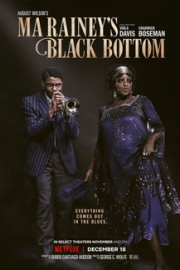Ma Rainey’s Black Bottom
There’s an energy to Chadwick Boseman’s Levee that would exist even if he were still alive. Knowing that this is his final performance, though, it’s obvious that Boseman still had a great amount of heart and energy left to give as a performer. It makes me miss him more. But it’s not just Boseman here; as the titular Ma Rainey, Viola Davis is a force of nature, and the collision of these two make “Ma Rainey’s Black Bottom” a tremendous entertainment.
Adapted from August Wilson’s stage play, the film by George C. Wolfe maintains a stage-bound feel, but has an energy to it because the music, written by Branford Marsalis, is just good for the soul, and those performances. The year is 1927 in Chicago, and Ma Rainey (Davis) is a popular Blues singer in town cutting a new record. We first see her on stage with her backing band and dancers, and the trumpet player, Boseman’s Levee, is being a bit of a showboat. She gets him to back down, but it’s the beginning of the tension between the two as, before they go out of town for the next date on their tour, they’ll go record a few songs for Ma Rainey’s longtime producers, Irvin (Jeremy Shamos) and Stardyvant (Jonny Coyne). As the band is waiting, generational and creative tensions arise between Levee and the rest of the band- Cutler (Colman Domingo), Toledo (Glynn Turman) and Slow Drag (Michael Potts)- as Levee, ever the showboat, wants to get some of his own work heard, but it’ll ultimately be up to Ma. When she promises her stuttering nephew (Dusan Brown) a chance to introduce the titular song, those tensions will inflame an already volatile situation, as Ma Rainey is late, causing the recording schedule to fall behind.
Ma Rainey was a real artist in the early 1900s Blues scene, and Wilson’s play is one of his “Pittsburgh Cycle,” chronicling the 20th Century African-American experience. Here, we get the way white producers would try to use Black artists for their own financial gain, or to appropriate their music for white musicians, as when Levee tries to sell himself as a solo act to Irvin and Stardyvant, only to have them reject him, but want his music, leading to a decision that will change his life forever. Levee feels like a 180 degree shift from the inspirational characters we’re used to seeing Boseman play, whether its Jackie Robinson or T’Challa or Ernie Davis (from “The Express”)- even at a young age compared to his fellow band members, he has an awareness of Black standing in the United States at that time that is borne of cynicism and bitterness over the way Blacks are treated in the country. And yet, he’s hopeful he can break through; his new shoes, which he got prior to the recording session, are emblematic of his hope. When they accidentally get scuffed by a band member, his rage is a reflection of his sense of the disrespect he’s been shown. Boseman nails every nuance and word in the screenplay by Ruben Santiago-Hudson, and it’s one of his best moments on screen. He had so much more he was ready to give us; this role makes me miss him all the more.
August Wilson just brings out the best in Viola Davis, though. Whether it’s “Fences” or this, it’s like she understands the way to bring a naturally theatrical role to life in a heartfelt and heartbreaking manner. Here, she is given a diva role which she sinks her teeth into with aplomb and wicked energy, but by the end, the session has taken a lot out of her, and away from her, as she’s ready for the next leg of her musical career. Irvin and Stardyvant aren’t ready to let her go that easily, but at least she feels freer than Levee at the end of the story. Besides, “Ma Rainey’s Black Bottom” will live on, arguably more than whatever Irvin and Stardyvant have planned next. At 94 minutes, this film comes in hot, and leaves us with plenty to think about on the way to its next tour date.










